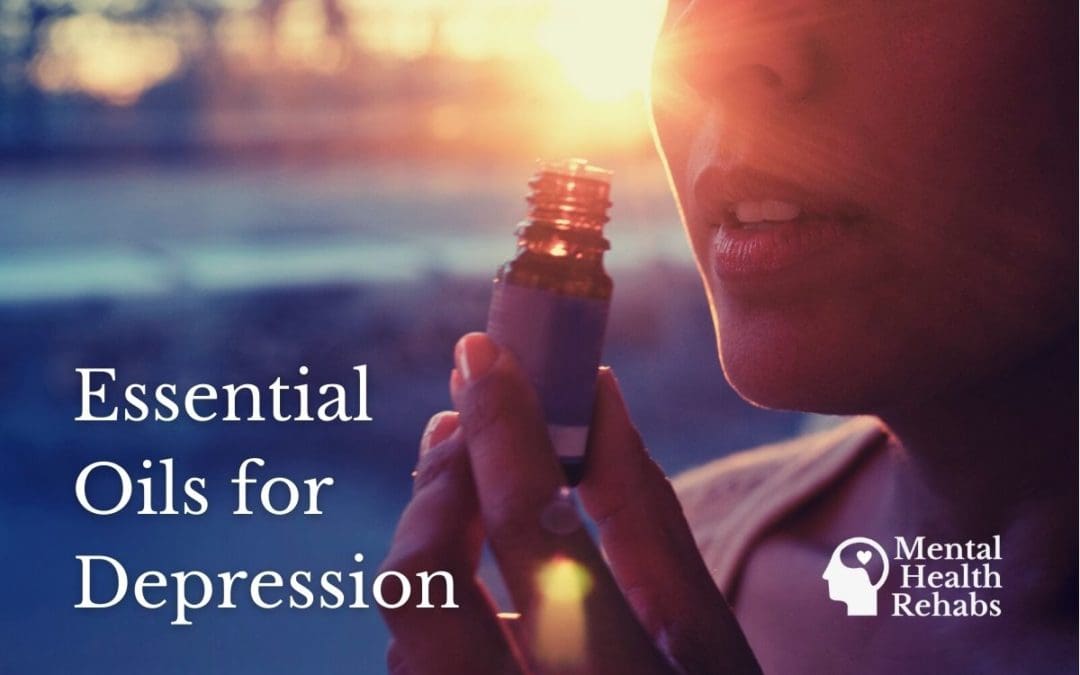Depression is a mental health disorder characterized by persistently depressed moods or loss of interest in previously enjoyable activities. People use essential oils as complementary treatments for many conditions, including depression. While essential oils aren’t a cure for depression, it’s a popular drug-free option that can help with some physical and psychological symptoms.
How Does Aromatherapy Work for Depression
Aromatherapy is a holistic treatment that uses natural plant extracts to promote wellbeing. Also called oil therapy, this treatment uses aromatic essential oils to improve the body, mind, and spirit. Recently, aromatherapy has gained recognition and been promoted as a complementary treatment for depression and other mental health disorders.
Some people use aromatherapy through the sense of smell and skin absorption. They add essential oils to diffusers, inhalers, bathing salts, facial steamers, and body oils.
Researchers believe that smelling these oils can activate areas of the brain that control behavior, emotions, memory, and moods. The connection between smell and feelings might link depression after aromatherapy. This is why certain essential oils may provide relief by reducing anxiety and stress symptoms.
Some preliminary studies suggest fragrance (like citrus) can help normalize hormone levels and produce effects similar to antidepressants. Other studies found a discrepancy in the effectiveness of aromatherapy through inhalation or massage therapy, giving mixed results to the benefits. Overall, there’s limited evidence and research behind the benefits of aromatherapy.
Best Essential Oils for Depression
Most essential oils are safe to use and can promote feelings of well-being. Nonetheless, essential oils shouldn’t be regarded as a cure for depression or other mental health disorders. The most popular oils for depression include lavender, bergamot, yuzu, rose otto, sage, jasmine, and rosemary.
Lavender
Lavender oil has been shown to have effects on helping with postpartum depression. Studies suggest the scent of lavender can help ease stress and anxiety when inhaled.
Best for: Relieve anxiety, manage stress, promote relaxation, and improve overall mood.
Ginger
Some animal studies have shown that ginger oil protects the brain from stress-related damage. Researchers found that ginger extract can help reduce anxiety and depression symptoms in rats.
Best for: Lowering symptoms common in depression and may help lower stress levels.
Bergamont
Bergamont is particularly helpful for anxiety, which is very common in people with depression. One study found that bergamot essential oil could reduce anxiety in patients waiting for surgery.
Best for: Treating symptoms of anxiety and other signs of ongoing depression.
Using Essential Oils for Depression
Many essential oils can help improve some depression symptoms. There are many ways to use aromatherapy to ease depression, stress, and anxiety symptoms. Whether you choose to inhale the scent directly or allow it to disperse in an area is up to you. These are some of the most common methods for using essential oils:
- Inhale the scent directly from the bottle or inhaler tube.
- Dab a few drops of the essential oil onto your hands or cotton ball and inhale directly.
- Add a few drops of the oil to a diffuser and inhale indirectly.
- Take an aromatherapy bath by adding several drops of essential oils to your bathwater.
- Add a few drops of the oil to massage oil and enjoy an aromatherapy massage.
Keep in mind, you shouldn’t be smelling these oils for hours. If you’re using a diffuser, turn it on up to three times a day for up to 30 minutes to reap all the benefits. Overexposure and the act of inhaling essential oils can lead to headaches. When using essential oils, a rule of thumb is to use between 5 to 10 drops per 1 ounce of carrier oil.
Getting Help for Depression
If you’re experiencing depression, talk to your doctor about your symptoms. Undiagnosed and untreated depression can often lead to other issues like substance use disorders. A mental health professional can work with you to develop the best treatment plan for you. Ask your doctor or a trained aromatherapist to learn more about aromatherapy if you’re interested in essential oils. They can help you figure out the best way to incorporate essential oils to complement your treatment plan.
Again, remember that aromatherapy alone isn’t a treatment for depression. It should be combined with other psychotherapies. If you or someone you know is dealing with depression, seek help. Call the Substance Abuse and Mental Health Administration (SAMHSA) Helpline at 1-800-662-4357.
Sources:
https://pubmed.ncbi.nlm.nih.gov/8646568/
https://pubmed.ncbi.nlm.nih.gov/27095995/

